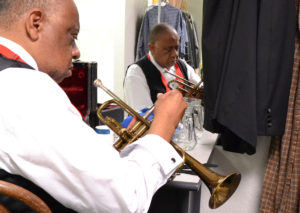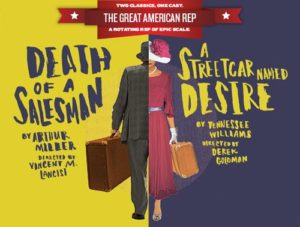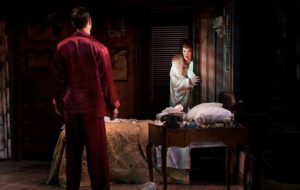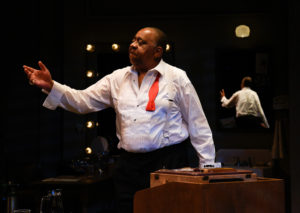 “All wishes, whatever their apparent content, have the same and unvarying meaning: ‘I refuse to be what I am.’”
“All wishes, whatever their apparent content, have the same and unvarying meaning: ‘I refuse to be what I am.’”
W.H. Auden, “Interlude: West’s Disease” (from The Dyer’s Hand)
Terry Teachout on the arts in New York City
 Palm Beach Dramaworks’ production of Satchmo at the Waldorf, starring Barry Shabaka Henley and directed by me, opens tonight in West Palm Beach. With two successful public previews under our belts, I now feel safe in saying that we’re ready to light the candle. In fact, everything went so smoothly at Thursday’s preview performance that I unhesitatingly canceled today’s final rehearsal. Instead we’re all going to stay home and rest up. As my Louis Armstrong says in Satchmo, “Wanna please the people, get you a good night’s sleep.” Afternoon naps don’t hurt, either.
Palm Beach Dramaworks’ production of Satchmo at the Waldorf, starring Barry Shabaka Henley and directed by me, opens tonight in West Palm Beach. With two successful public previews under our belts, I now feel safe in saying that we’re ready to light the candle. In fact, everything went so smoothly at Thursday’s preview performance that I unhesitatingly canceled today’s final rehearsal. Instead we’re all going to stay home and rest up. As my Louis Armstrong says in Satchmo, “Wanna please the people, get you a good night’s sleep.” Afternoon naps don’t hurt, either.
This is, as regular readers of this blog know, my professional debut as a stage director. But it is also, incredible as it may sound, my ninth opening night to date for Satchmo, and I’m just as delighted as I was in Orlando, Lenox, New Haven, Philadelphia, New York, Beverly Hills, Chicago, and San Francisco—as well as in Santa Fe, Philadelphia, and Louisville, the cities where my three operas opened. It doesn’t get old.
In preparation for the big night, I present—as I always do before my opening nights—the following clip, which I first saw on TV as a child and which in recent years has become increasingly relevant to my life.
Break a leg, everybody:
 In today’s Wall Street Journal I file the second of two reports from Baltimore’s Everyman Theatre, which is currently presenting Death of a Salesman and A Streetcar Named Desire in rotating repertory. Here’s an excerpt.
In today’s Wall Street Journal I file the second of two reports from Baltimore’s Everyman Theatre, which is currently presenting Death of a Salesman and A Streetcar Named Desire in rotating repertory. Here’s an excerpt.
* * *
Baltimore’s Everyman Theatre is presenting Tennessee Williams’ best-known play in rotating repertory with Arthur Miller’s “Death of a Salesman.” You may not realize how unusual this is: It is now possible for what is by all accounts the first time to see live performances of the two most influential American plays of the postwar era performed by the same cast on the same stage on the same day. That’s big news, and good news.
 Like Vincent M. Lancisi, whose exceptional “Salesman” I reviewed last week, Derek Goldman has given us a production that sticks to the Gospel According to Elia Kazan, whose 1951 film of “Streetcar” was no less closely based on his Broadway staging. The time is 1947, the place a sordid-looking two-room railroad flat in the French Quarter of New Orleans, and the characters are all pretty much as you remember them: Blanche DuBois (Beth Hylton) is a flirty, fluttery southern belle who isn’t as young as she used to be, and Stanley (Danny Gavigan) is a working-class brute to whose physical charms Stella (Megan Anderson), his wife and Blanche’s sister, is in thrall. You’ll know your way, too, around Daniel Ettinger’s set, which recalls the not-quite-realistic tenement that Jo Mielziner conjured up for Kazan….
Like Vincent M. Lancisi, whose exceptional “Salesman” I reviewed last week, Derek Goldman has given us a production that sticks to the Gospel According to Elia Kazan, whose 1951 film of “Streetcar” was no less closely based on his Broadway staging. The time is 1947, the place a sordid-looking two-room railroad flat in the French Quarter of New Orleans, and the characters are all pretty much as you remember them: Blanche DuBois (Beth Hylton) is a flirty, fluttery southern belle who isn’t as young as she used to be, and Stanley (Danny Gavigan) is a working-class brute to whose physical charms Stella (Megan Anderson), his wife and Blanche’s sister, is in thrall. You’ll know your way, too, around Daniel Ettinger’s set, which recalls the not-quite-realistic tenement that Jo Mielziner conjured up for Kazan….
If you’ve never seen “Streetcar,” you’ll come away from this version knowing exactly what the play is about, and you’ll succumb with dark joy to its musky hot-weather spell—and to the acting of the fine cast….
The strengths of the production outweigh its occasional flaws, as does the fact that it’s running in repertory with “Death of a Salesman.” It’s easy to spot the differences between the two plays, but to see them performed in close succession underscores their commonality: Blanche, like Willy Loman, is the negation of the American dream, a woman who has pursued happiness in the wrong way and must now pay a fearful price for her mistake. The overused phrase “once in a lifetime” rarely stands up to more than casual scrutiny, but this is one of those rarer-than-rare occasions on which it is nothing more than the truth….
* * *
Read the whole thing here.
To read last week’s review of Death of a Salesman, go here.
The theatrical trailer for Elia Kazan’s 1951 film of A Streetcar Named Desire:
 Louis Armstrong and His All Stars record “I Ain’t Got Nobody” in 1959. This sound film, shot at the sessions for Satchmo Plays King Oliver, is the only known footage of Armstrong at work in the recording studio. Its existence was unknown until it was discovered in a storage facility 2012. The other musicians seen in the clip are Peanuts Hucko on clarinet, Trummy Young on trombone, Billy Kyle onpiano, Mort Herbert on bass, and Danny Barcelona on drums:
Louis Armstrong and His All Stars record “I Ain’t Got Nobody” in 1959. This sound film, shot at the sessions for Satchmo Plays King Oliver, is the only known footage of Armstrong at work in the recording studio. Its existence was unknown until it was discovered in a storage facility 2012. The other musicians seen in the clip are Peanuts Hucko on clarinet, Trummy Young on trombone, Billy Kyle onpiano, Mort Herbert on bass, and Danny Barcelona on drums:
(This is the latest in a series of arts-related videos that appear in this space each Monday, Wednesday, and Friday)
 “Comparing what we’re looking for misses the point. It’s wanting to know that makes us matter. Otherwise we’re going out the way we came in. That’s why you can’t believe in the afterlife, Valentine. Believe in the after, by all means, but not the life. Believe in God, the soul, the spirit, the infinite, believe in angels if you like, but not in the great celestial get-together for an exchange of views. If the answers are in the back of the book I can wait, but what a drag. Better to struggle on knowing that failure is final.”
“Comparing what we’re looking for misses the point. It’s wanting to know that makes us matter. Otherwise we’re going out the way we came in. That’s why you can’t believe in the afterlife, Valentine. Believe in the after, by all means, but not the life. Believe in God, the soul, the spirit, the infinite, believe in angels if you like, but not in the great celestial get-together for an exchange of views. If the answers are in the back of the book I can wait, but what a drag. Better to struggle on knowing that failure is final.”
Tom Stoppard, Arcadia
The first public preview of Palm Beach Dramaworks’ production of Satchmo at the Waldorf, which took place last night, went so smoothly that I canceled today’s rehearsal. With one final preview remaining before Friday’s opening-night performance, we’re a heartbeat away from freezing the show, and I’m already starting to feel a surge of prospective relief.
 One thing that went especially well was the pre-show no-cellphones announcement, which was written by me and recorded by Barry Shabaka Henley, the star of Satchmo. It’s a show-specific variation of the all-purpose announcement that I published three months ago in a Wall Street Journal “Sightings” column called “How to Stop Theater’s Cellphone Scourge.”
One thing that went especially well was the pre-show no-cellphones announcement, which was written by me and recorded by Barry Shabaka Henley, the star of Satchmo. It’s a show-specific variation of the all-purpose announcement that I published three months ago in a Wall Street Journal “Sightings” column called “How to Stop Theater’s Cellphone Scourge.”
I was seated on the extreme right-hand side of the house as it played for the first time, and I could see that everyone in the audience took in what Shabaka was saying—and acted on it. Not a single cellphone rang or was otherwise used during the ninety-minute performance that followed.
For the benefit of anyone who is grappling with the problem of how to get theater patrons to turn off their cellphones, I reprint below the relevant portion of my column. I’ll let you know whether it’s similarly effective at future performances of Satchmo, but as of now, I think maybe we’re onto something.
UPDATE: For a progress report on the efficacy of this announcement, go here.
* * *
Yes, cellphone abuse has reached pestilential proportions, but everybody in the profession privately admits that existing announcements, be they clever or straightforward, do next to nothing to reduce it. Why? Because the announcements aren’t made in such a way as to seize the attention of playgoers and persuade them to change their ways. Instead, they’re either cutesy-pie or pro forma, both of which signal that they needn’t be taken seriously.
Unfortunately, Patti LuPone’s widely reported in-your-face technique of shaming errant cellphone users by singling them out from the stage doesn’t seem to work any better. That doesn’t surprise me. Instead of insulting them, the trick is to get their attention—and get them on your side….
 • First, get the audience’s attention by lowering the house lights. Then make the announcement, either live from the stage or, even better, in the form of a video projected in front of the curtain. Either way, it must be loud enough to cut through the pre-show chatter. It should also be made in a listen-up-folks manner, not in the blandly cheery tones of the pre-recorded safety messages that air travelers habitually tune out.
• First, get the audience’s attention by lowering the house lights. Then make the announcement, either live from the stage or, even better, in the form of a video projected in front of the curtain. Either way, it must be loud enough to cut through the pre-show chatter. It should also be made in a listen-up-folks manner, not in the blandly cheery tones of the pre-recorded safety messages that air travelers habitually tune out.
• If the announcement is pre-recorded, it should be made by the star of the show.
• Avoid passive boilerplate language like “Please refrain from using cellphones during the performance.” Use plain, direct words—and explain why it’s in everybody’s own interests to turn off their phones.
• At the end of the announcement, pause for 30 seconds to give everybody time to turn off their phones before the show starts.
Here’s what I have in mind:
“Hello, everybody. I’m John Doe, the star of ‘Hamlet,’ and I need your help during tonight’s performance. Right now, before we get started, I want you to take out your cellphone…turn it off…and leave it off during the show. Don’t answer calls, don’t take selfies, don’t send texts. This is important, not just for me but for you.
“You may not know it, but whenever anyone uses a cellphone, I can see it up here on stage, and so can everybody else in the theater. Even if you don’t talk on the phone, it still lights up your face. That’s distracting to the people around you—and it’s distracting to me, too. It makes it harder for me to concentrate, and it might even cause me to forget my lines.
“I know your tickets cost a lot. So if you want to get your money’s worth, you should check—right now—to make sure your phone is off. Remember: No calls, no pictures, no texts. Do it for me, for your neighbors, and for yourself. Thank you very much.”
Here’s my list of recommended Broadway, off-Broadway, and out-of-town shows, updated weekly. In all cases, I gave these shows favorable reviews (if sometimes qualifiedly so) in The Wall Street Journal when they opened. For more information, click on the title.
BROADWAY:
• An American in Paris (musical, G, too complex for small children, reviewed here)
 • The Color Purple (musical, PG-13, virtually all performances sold out last week, reviewed here)
• The Color Purple (musical, PG-13, virtually all performances sold out last week, reviewed here)
• Eclipsed (drama, PG-13, Broadway remounting of off-Broadway production, closes June 19, original production reviewed here)
• Fully Committed (comedy, PG-13, closes July 24, reviewed here)
• Fun Home (serious musical, PG-13, some performances sold out last week, reviewed here)
• Hamilton (musical, PG-13, Broadway transfer of off-Broadway production, all performances sold out last week, reviewed here)
• The King and I (musical, G, perfect for children with well-developed attention spans, some performances sold out last week, reviewed here)
• Matilda (musical, G, closing Jan. 1, reviewed here)
• Les Misérables (musical, G, too long and complicated for young children, closes Sept. 4, reviewed here)
• On Your Feet! (jukebox musical, G, reviewed here)
• She Loves Me (musical, G, suitable for bright children capable of enjoying a love story, many performances sold out last week, closes July 10, reviewed here)
OFF BROADWAY:
• The Fantasticks (musical, G, suitable for children capable of enjoying a love story, reviewed here)
IN BALTIMORE:
• Death of a Salesman (drama, PG-13, closes June 12, reviewed here)
CLOSING SOON IN CHICAGO:
• Mary Page Marlowe (drama, PG-13, extended through June 5, reviewed here)
An ArtsJournal Blog